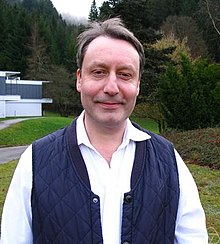Keith Martin Ball
Keith Ball | |
|---|---|
 Ball in 2009 | |
| Born | Keith Martin Ball 26 December 1960[2] New York City[2] |
| Alma mater | Trinity College, Cambridge |
| Awards |
|
| Scientific career | |
| Fields | |
| Institutions | |
| Thesis | Isometric problems in lp̲ and sections of convex sets (1986) |
| Doctoral advisor | Béla Bollobás[3] |
| Website | |
Keith Martin Ball (born 26 December 1960) is a mathematician and professor at the University of Warwick. He was scientific director of the International Centre for Mathematical Sciences (ICMS) from 2010 to 2014.[4][5][6][7][8]
Education
Ball was educated at Berkhamsted School[2] and Trinity College, Cambridge[2] where he studied the Cambridge Mathematical Tripos and was awarded a Bachelor of Arts degree in mathematics in 1982 and a PhD in 1987 for research supervised by Béla Bollobás.[9]
Research
Keith Ball's research is in the fields of functional analysis, high-dimensional and discrete geometry and information theory. He is the author of Strange Curves, Counting Rabbits, & Other Mathematical Explorations.[10]
Awards and honours
Ball was elected a Fellow of the American Mathematical Society (AMS) in 2012[11] and a Fellow of the Royal Society (FRS) in 2013. His Royal Society citation reads
Keith Ball is an exceptionally original mathematician whose work has had a major influence on two branches of mathematics: functional analysis and information theory. He proved the first extension theorems for Lipschitz functions not reducible to one-point extensions and solved the reverse isoperimetric problem. He produced a sharp version of the Banach-Steinhaus Theorem conjectured in the 50s, and proved that infinitely many values of the Riemann function at odd integers are irrational (with Rivoal). (With Artstein, Barthe and Naor) he answered a fundamental question in information theory by showing that the central limit theorem of probability is driven by an analogue of the second law of thermodynamics. Since 2010 Ball has served as Scientific Director of ICMS in Edinburgh. He also successfully popularises science, for example in his book "Strange curves. ... "[12]
In 2023, he was elected a member of the Academia Europaea.[13]
References
- ^ "Professor Keith Martin Ball FRS FRSE". Royal Society of Edinburgh. Archived from the original on 14 February 2022. Retrieved 14 February 2022.
- ^ a b c d e "BALL, Prof. Keith Martin". Who's Who 2014, A & C Black, an imprint of Bloomsbury Publishing plc, 2014; online edn, Oxford University Press. Archived from the original on 14 February 2022. Retrieved 20 February 2014.
- ^ Keith Martin Ball at the Mathematics Genealogy Project
- ^ Keith Martin Ball's publications indexed by the Scopus bibliographic database. (subscription required)
- ^ Ball, K.; Carlen, E. A.; Lieb, E. H. (1994). "Sharp uniform convexity and smoothness inequalities for trace norms". Inventiones Mathematicae. 115: 463–482. Bibcode:1994InMat.115..463B. doi:10.1007/BF01231769. S2CID 189831705.
- ^ Ball, K. (1992). "Markov chains, Riesz transforms and Lipschitz maps". Geometric and Functional Analysis. 2 (2): 137–172. doi:10.1007/BF01896971. S2CID 121182780.
- ^ Artstein, S.; Ball, K. M.; Barthe, F.; Naor, A. (2004). "Solution of Shannon's problem on the monotonicity of entropy" (PDF). Journal of the American Mathematical Society. 17 (4): 975. doi:10.1090/S0894-0347-04-00459-X.
- ^ Keith Martin Ball publications indexed by Microsoft Academic
- ^ Ball, Keith Martin (1986). Isometric problems in lp̲ and sections of convex sets (PhD thesis). University of Cambridge. Archived from the original on 26 February 2014. Retrieved 20 February 2014.
- ^ Ball, Keith (2006). Strange Curves, Counting Rabbits, & Other Mathematical Explorations. Princeton University Press. ISBN 0691127972. Archived from the original on 20 April 2015. Retrieved 27 April 2015.
- ^ "List of Fellows of the American Mathematical Society". American Mathematical Society. Archived from the original on 20 May 2019. Retrieved 7 May 2015.
- ^ "Professor Keith Ball FRS". London: Royal Society.
- ^ "Keith Ball". Member. Academia Europaea. Retrieved 27 October 2024.
